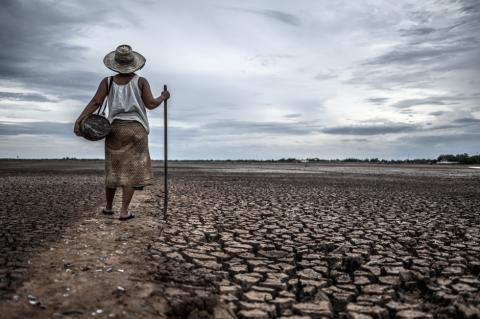
Centering Care in a Feminist Intersectional Approach to Loss and Damage
As the pandemic and escalating climate crisis has exacerbated inequalities and reminded us of the centrality of care in our societies, ESCR-Net held a CSW66* parallel event entitled “Centering Care In a Feminist Intersectional Approach to Loss and Damage” (24 March 2022). During the event, women's rights advocates and feminist activists from across regions reflected on advancing action to ensure the rapid, equitable, ecologically sustainable, and just transition away from fossil fuels to a zero-carbon, regenerative care-based society focused on the well-being of people and the planet.
In their interventions, the participants underlined how the climate crisis and the resulting loss and damage disproportionately impact marginalized people, including women and girls in all their diversity, as well as across gender identities and sexual orientations, pointing to capitalism and patriarchy as structural drivers of the climate crisis. They also stressed the immense transformative power of feminist and environmental struggles when they are linked.
The online exchange featured interventions of Charlene May, Women’s Legal Center (WLC), South Africa; Alejandra Lozano, The Global Initiative for Economic, Social and Cultural Rights (GI-ESCR); Tetet Nera-Lauron, Rosa Luxemburg Stiftung; Claudia Lazzaro, Sindicato Obreros Curtidores De La República (SOCRA); Eydi Blanco, Organización Fraternal Negra Hondureña; and Hala Murad, Dibeen Association for Environmental Association; Kavita Naidu, International Human Rights Lawyer, and Kate Donald, Center for Economic and Social Rights (CESR), co-moderated the session.
In her introduction, Kavita Naidu opened the session by reminding us that “women are the primary caretakers of our society – they sustain our economies by taking care of life and our social well-being.”
Echoing those words, Charlene May (Women’s Legal Center) invited to challenge the dominant narratives and approaches around care work, especially in light of the current Covid-19 pandemic. In her words, “we need to reject economic growth as the dominant and only paradigm of development and understand that limitless economic growth and pursuit of profit are unsustainable for all forms of life."
While care work depends primarily on women, a contribution largely unrecognized, invisibilized and precarized by the dominant patriarchal capitalist model, women are also at the forefront of the fight against the climate and biodiversity crises. According to Tetet Nera-Lauron, Rosa Luxemburg Stiftung: “When disasters strike, women leaders initiate community kitchens. Volunteers from the community offer support in preparing and distributing food. And because they are themselves survivors of these calamities, they can respond quickly, helping themselves and other survivors from their community with hot meals and other food essentials.”
Because the climate crisis affects women in all areas of their lives, the world of work is also impacted by loss and damage. Claudia Lazzaro (SOCRA) highlithed the consequences of climate disasters on the working conditions of women, especially domestic workers, who often work under precarious conditions and in the informal sector. “The most precarious jobs are carried out by women and LGBT people. The precariousness of poverty is carried by our bodies and our families. We must rethink society, the care economy and re-found a fairer social pact of care that is sustainable with our bodies, our families and communities".
Kate Donald (Center for Economic and Social Rights) recalled during this event that “care for people and care for the environment are collective goods” and highlighted ESCR-Net’s collective demand for the urgency of a new social pact on care.
Focusing on the role of just transition frameworks and expanding provision of and access to quality public services, such as renewable energy and social protection, Alejandra Lozano (The Global Initiative for Economic, Social and Cultural Rights) emphasized that in order “to reduce the burden of loss and damage in affected individuals and communities, we need to foster a gender-just transition framework placing gender, care, and the protection of ecosystems at the heart of the shift towards a sustainable and just future.”
While loss and damage discourse is still largely dominated by technical and policy discussions, Eydi Blanco (Ofraneh) reminded us that at the community level, women are already very active in implementing holistic solutions linking care work with the protection of the environment and local living conditions. According to Eydi “in Honduras, climate impacts or loss and damage are very pervasive and have hugely affected human rights. As we confront loss and damage, we also must also think about foregrounding and implementing community-led alternatives and solutions.”
It is not enough to say that women play an important role in this intersection between climate and care work. They need to be actively involved in analyzing the issues and developing and monitoring measures to prevent, anticipate and respond to climate change-related disasters. According to Hala Murad (Dibeen Association for Environmental Association, Jordan), “we need to integrate the gender dimension into every discussion around loss and damage and climate change. We need to join our efforts to make a real change”.
Watch the video of the parallel event here. (Available only in English)
See the conversation on Twitter: (Available only in English)
This event is one of the 2 events organized by ESCR-Net members in the context of the CSW66.
On 23 March 2022, the Network hosted the virtual parallel event:
“Ensuring Women’s Land Rights in the Face of Corporate Capture of Solutions to the Climate and Biodiversity Crises.”
Watch the video of the parallel event here. (Available only in English)
See the conversation on Twitter: (Available only in English)
* Each year in March, representatives of member states meet in New York to assess developments and measures to advance gender equality and women's rights worldwide. During the sessions of the United Nations Commission on the Status of Women (CSW) many civil society organizations, feminists, and defenders of women's rights come together to bring their demands to the attention of States and to reflect together on the strategies to be adopted to meaningfully improve women’s rights.
